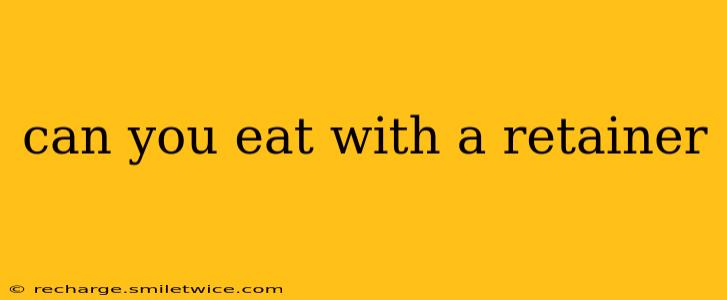Wearing a retainer is crucial for maintaining that perfect smile after orthodontic treatment. But what about eating? Can you eat with a retainer? The short answer is: it depends. While you can technically eat with some types of retainers, it's generally not recommended, and certain foods are absolute no-gos. This comprehensive guide will explore the nuances of eating with retainers, helping you understand the best practices to protect your investment and your pearly whites.
What Types of Retainers Are There?
Understanding the different types of retainers is key to answering the question of eating with them. There are primarily three main types:
- Essix Retainers (Clear Retainers): These are removable, clear plastic aligners similar to Invisalign. They're often the most comfortable, but also the most prone to damage from food.
- Hawley Retainers: These are removable retainers made of metal wire and acrylic. They're more durable than Essix retainers but can be less comfortable.
- Permanent Retainers: These are bonded directly to the back of your teeth and are not removable. Eating with a permanent retainer is not an issue, as it's a fixed appliance.
Can You Eat With an Essix Retainer?
The answer is generally no. Essix retainers, while comfortable, are made of a relatively thin and brittle plastic. Hard foods can easily crack or break them, rendering them useless and requiring costly replacements. Even sticky foods can cause damage or make it difficult to clean thoroughly, leading to bacterial growth and potential problems.
What Happens If You Eat With an Essix Retainer?
Eating with an Essix retainer can lead to several problems:
- Cracks and Fractures: Hard foods can easily crack or fracture the plastic, compromising its fit and effectiveness.
- Staining: Certain pigmented foods and drinks can stain the retainer, making it less aesthetically pleasing.
- Bacterial Growth: Food particles trapped under the retainer can contribute to bacterial growth, leading to bad breath and potential gum disease.
- Retainer Breakage: In severe cases, the retainer can break completely, requiring a new one.
Can You Eat With a Hawley Retainer?
While Hawley retainers are more durable than Essix retainers, it's still generally not recommended to eat with them. The metal wires can be bent or broken by hard foods, and food particles can become trapped in the acrylic, making it difficult to clean.
Can You Eat With a Permanent Retainer?
Since permanent retainers are cemented to the teeth, eating with them is not a problem. However, proper oral hygiene is still crucial to prevent food particles from becoming trapped behind the wire and causing gum irritation or cavities.
What Foods Should You Avoid When Wearing a Retainer?
Regardless of the retainer type (excluding permanent retainers), certain foods should always be avoided:
- Hard Foods: Anything that requires significant chewing force, like nuts, hard candies, ice, popcorn kernels, and raw carrots, can damage your retainer.
- Sticky Foods: Sticky foods like caramel, taffy, and chewing gum can adhere to the retainer, making it difficult to clean and potentially causing damage.
- Chewy Foods: Tough, chewy foods like bagels and jerky can also put stress on your retainer and make cleaning difficult.
How to Eat Safely With a Removable Retainer
If you need to eat while wearing a removable retainer (for a very brief time), carefully remove it beforehand and store it in a safe place.
How to Clean Your Retainer Properly
Proper cleaning is vital to maintaining the hygiene and longevity of your retainer. Use a soft-bristled toothbrush and a retainer cleaning solution (avoid abrasive cleaners) to brush your retainer thoroughly after each use. Follow the instructions of your orthodontist for cleaning specific retainer materials.
Conclusion
While technically possible to eat with some retainers, it’s generally not advisable. To maintain the integrity and longevity of your retainer, and most importantly, your smile, it's best to remove your removable retainer before eating and practice excellent oral hygiene. Remember to consult your orthodontist if you have any concerns or questions about your retainer.
